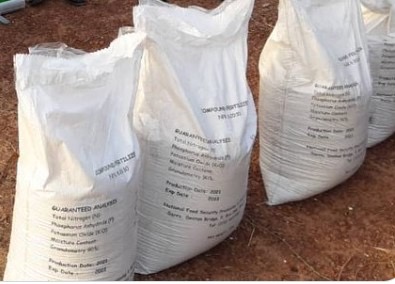Cost Of Gov’t Subsidised Fertilizer Increases To D2500

By Buba Gagigo
Farmers in the Lower River Region (LRR) have confirmed to Leeral Media Gambia that the Government has increased the cost of a bag of its subsidized fertilizer to D2500.
In a course of a year, from D700, the cost of a bag of fertilizer has tripled from
2021 to 2022.
Leeral Media Gambia reported that the Ministry of Agriculture in partnership with National Food Security Processing and Marketing Cooperation (formerly GGC) on Wednesday, met with farmers and other stakeholders in Jenoi LRR.
The meeting was to devise effective measures to prevent government-subsidized fertilizers from leaving the country, the new online medium added on Thursday.
“The power of the farmers towards farming has reduced a lot today because we are very sure of the price that they put on the fertilizer; there is no farmer who can buy it for that. Last year (2021), they (Government) sold it to us for D700 and today (2022) the personnel from the GGC and the office of the president are saying D2500 per bag. In fact, not all the types of fertilizers are available, but only two types are available. The fertilizer for coos is not still available, and for the one that is available, they are saying D2500 per bag which is too hard on us,” Sainey Taal, one of the farmers reacted in a post-meeting interview with Leeral Media Gambia.
Meanwhile, the Gambia Government announced spending US$11 million on fertilizer subsidies in the 2021-farming season.
“For the upcoming farming season, the gov’t will provide fertilizer to farmers at a subsidized price of D700 per bag. Under the leadership of Hon. Minister of Agriculture Amie Fabureh, gov’t invested US$11 million to purchase the fertilizer to help boost production,” a State House Tweet on 3rd April 2021 read.
However, part of the subsidized fertilizer was reportedly sold in Senegal, to the disadvantage of Gambian farmers.


Comments are closed.